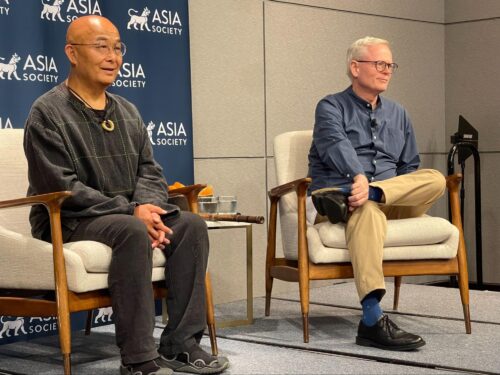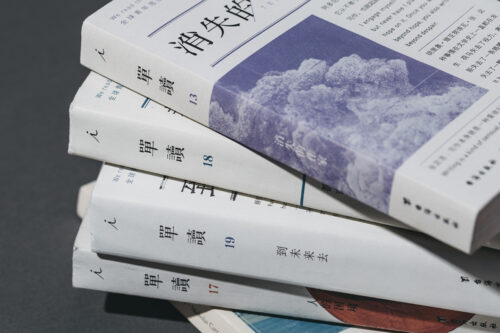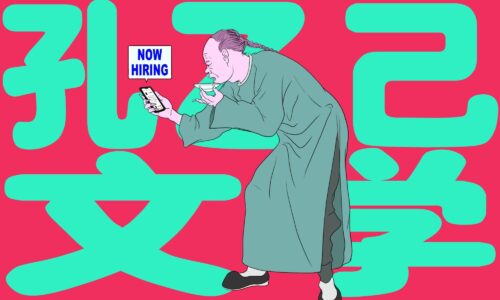
China is producing and consuming the largest amount of web fiction in the world, with an estimated 20 million full-time, part-time, and dabbling writers. The grind is hard, and the conditions can be exploitative, but those who do it are on the vanguard of a reading revolution.

In 2018, Jue had life all planned out. The 21-year-old from Ulankhad, Inner Mongolia was set to graduate with a degree in railway signaling, destined for a job as a technician in the country’s railway system. But this plan unraveled when he fell down a staircase and broke a leg just before graduation. The injury ruined his chances of being hired. Employers simply would not take on someone on crutches, and there was no guarantee that he would be eligible for entry-level positions for fresh graduates the year after. Jobless, temporarily disabled, and too proud to ask his parents for money, he tried to earn an income in the only other way he could: he logged onto a fiction platform and started writing web novels.
In a few months, Jue was making enough money to support himself. He is now writing full-time on Qidian, a top platform where writers like Tang Jia San Shao (TJSS), Tian Can Tu Dou, and Mao Ni have made a name — and hundreds of millions of RMB — for themselves. With his time-travel historical novels, Jue can bring home 15,000 yuan ($2,222) a month in royalties, as long as he writes 10,000 words per day — not bad for a now-26-year-old in a medium-sized town in northwestern China.
China is producing and consuming the largest amount of web fiction in the world. Jue is one of more than 20 million full-time, part-time, and dabbling web fiction writers who churn out hundreds of millions of words daily on platforms to satisfy the appetite of 502 million readers, almost half of China’s entire online population. It is a 28.8 billion yuan ($4.4 billion) business with more than 26 million published titles. China Literature, the biggest player in the country, alone boasted 1.2 million new titles and 36 billion words on its dozens of platforms last year.
China’s web fiction has even reached the international market. Websites of translated Chinese web novels mushroomed in recent years, translations of danmei novels — a popular genre of web fiction that features male same-sex romance — have made New York Times bestsellers list recently, and the business model of Chinese web fiction has been exported overseas through international fiction platforms like Webnovel and Wuxiaworld that cultivate native English-language writers as well as readers.
China news, weekly.
Sign up for The China Project’s weekly newsletter, our free roundup of the most important China stories.
The web fiction that drives this boom is known as wǎngwén 网文, meaning, literally, “web literature.” It is a type of user-generated genre fiction serialized on online platforms where users write, publish, read, and interact with each other. These novels are typically curated according to genres, subgenres, and gender orientations — only two genders, male and female, are available — and tagged with specific tropes and themes.
If this does not sound like “serious” literature, that is because it is not. It is pleasure reading, escapist fiction, or popular literature, whatever you want to call it, a broad category that had been banned in the People’s Republic before the 1980s as a kind of corruptive and demoralizing bourgeois literature that went against socialist ideals.
In 1981, leader Dèng Xiǎopíng 邓小平 famously declared himself a fan of the novels by the legendary Hong Kong wuxia writer, Louis Cha, a.k.a., Jīn Yōng 金庸. A decade later, genre fiction from Hong Kong and Taiwan, mostly pirated copies, flooded the streets of China. The internet, a nascent medium at the time, quickly became a new territory for fans to share pirated novels. Some fiction forums also started to publish original works by mainland writers modeled on these wuxia novels, romances, and fantasies. And web fiction was born.
The early days of web fiction
In 2003, Qidian, founded only a year earlier, launched its VIP membership program, charging members two cents for every 1,000 words. Others followed suit. Paid original content went mainstream. Mobile technologies and payment systems accelerated the market’s growth in the 2010s. Money poured in, and investors, including IT giants like Tencent and Baidu, cultivated web fiction as both a revenue generator and a channel to bring traffic and resources to their core businesses. In the past few years, ads-supported free reading platforms have brought more readers into the fold. Now, one in every three Chinese is reading some fiction on the screen.
“In the early days of web fiction, there was not a single government agency in charge of regulating it,” said Huang Quan, one of the first staff writers of Qidian and former assistant editor-in-chief with the platform. (He and others interviewed for this story preferred to use aliases to protect their identities.) “You could write whatever you wanted, and publish whatever you wanted. There was a regulatory vacuum, and so the market grew wild.”
The longest-running novel on Qidian to date has more than 41 million characters. In comparison, a Chinese translation of Leo Tolstoy’s War and Peace runs merely 1.25 million characters.
Huang, who now owns an animation company and plays an online guru for wanna-be writers and editors on the popular social platform Zhihu, is convinced that China’s unique regulatory environment is a condition that has allowed web fiction to grow so big. Even with the increasingly tightened censorship, web fiction still has an edge over other media like print publishing, TV, and, more recently, TV’s web incarnation, web shows, which since 2019 have required pre-approval from the National Radio and Television Administration (NRTA) before going into production.
“In an American TV series…the episodes are shown as they are produced,” Huang said. “Depending on the feedback, the future plot and characters’ parts are adjusted dynamically to satisfy the audience. Through feedback, the audience in fact is participating in the creative process.”
In China, however, TV is not allowed to be produced without the full script being pre-approved. That makes web fiction an unmatched avenue in producing long serialized content that is extremely sensitive to audience response.
“Generations of readers grow up reading these novels, and they become writers themselves,” he said. “Through their practice, these writers and readers are participating in perhaps the biggest psychological experiment in human history on how to create content that responds to human beings’ basic instincts, stimulates their primal desires, and preys on their weakness.”
Content labs
Governed by the rule of the market, supported by the largest pool of human resources in the world as well as data-driven digital technologies, web fiction has become a gigantic content laboratory in China, where stories and elements of stories are created and tested by hundreds of millions of humans again and again for years on end. The result? Some of the most pleasurable, commercially successful, and/or addictive texts we have ever seen in the Chinese language.
That is, in spite of their ridiculous length. These novels can easily run hundreds or even thousands of chapters and several millions of words, as writers’ earnings on the platforms depend heavily on the length of the novel. The longest-running novel on Qidian to date, Dài Zhe Nóngchǎng Hùn Yì Jiè 带着农场混异界 by Míng Yǔ 明宇, has more than 41 million characters. It started serializing in 2017 and is still being updated daily. In comparison, a Chinese translation of Leo Tolstoy’s War and Peace runs merely 1.25 million characters (it is about 600,000 words in its original Russian).
Yet readers read them, and if they do not get their daily updates, they leave angry comments and make sure the writer knows it. In these novels, readers find their desires — the good, the bad, and the ugly — satisfied in the most unabashed ways. Even the act of reading itself, of following a seemingly endlessly serialized novel for months or even years, is almost a ritualistic performance that has a certain intrinsic value and offers something desirable — comfort, company, or even a sense of accomplishment.
“I can only say that it’s like an obsession,” said Jue, who grew up on a steady diet of web fiction. “It’s like collecting cards. If there are 100 cards in a set, when you’ve collected 99 of them, you will exhaust all means to have that last one. When you’re already following a book, at a few million words, you’ll keep reading to 10 million, and if (the writer) writes more, you’ll want to keep reading.”
Among the 100 most popular TV and web shows produced in 2018 and 2019, 42 were adapted from web fiction.
Web fiction’s reach, however, does not stop at fiction readers. In China’s popular culture pipeline, web fiction is a key supplier of raw materials (in the form of so-called IPs) for TV shows, audio dramas, animations, cartoons, and video games. The downstream cultural products derived from web fiction from 2019 to 2020 were valued at over 1 trillion yuan ($148 billion). In 2019, at the height of the “IP fever,” China Literature grossed over 4.4 billion yuan ($652 million) from IP licensing, or 53% of its revenue that year.
It’s safe to say that web fiction is shaping China’s pop culture in significant ways. Among the 100 most popular TV and web shows produced in 2018 and 2019, 42 were adapted from web fiction. My Heroic Husband, Joy of Life, The Untamed, and Word of Honor were some of the recent hit TV and web adaptations that captured not only a domestic audience but an international one.
It has also made top writers multimillionaires. In 2018, the TV and film rights of Heaven Official’s Blessing (天官赐福 tiān guān cì fú) by Mo Xiang Tong Xiu (MXTX, 墨香铜臭) were sold for 40 million yuan ($6 million). TJSS, China’s highest-earning web writer, made 130 million yuan ($19.5 million) in royalties in 2020 alone.
These are the so-called “deities” who have inspired millions to try their hands at web fiction. Most web writers, however, will never see a contract. Even for signed writers, it is still a struggle to get paid for their writing.
“I typically make a few tens a month,” a signed writer with Jin Jiang Wen Xue Cheng (JJWXC), a leading female-oriented fiction platform with big-name writers like MXTX and Priest, told the online magazine Vista. “Just enough to buy two milk teas.”
JJWXC is no outlier in the business. According to iReader’s data, less than 1% of writers on the platform earn an annual income that exceeds 100,000 yuan ($14,800).
Among web writers, “one in thousands can make a living by writing, and one in 100,000 can make good money,” said Huang, the former Qidian editor. The rest? They become “cannon fodder,” he said. “If it were a game, this is worse than gambling.”
But to Jue and many like him, writing is not a game. It is a job. It provides a kind of freedom and autonomy that may not be found in other jobs, though ironically, its most basic requirement, more than artistic talent, is the ability to produce continuously. When a novel is being serialized, Jue has to update it daily. The only way for him to take a break — and that includes weekends — is to write and save enough new material in advance. He can take some time off when a novel is completed, but not for long, because his income will dip and eventually dry up if he is not writing.
To motivate himself, Jue often gathers with a few writer friends online and writes together, competing with speed, a practice called pīnzì 拼字 — linking words. On a good day, Jue can write 10,000 words in two and a half hours, but sometimes, it can take an entire day for him to write that much. To do this consistently, day in and day out, takes stamina. A lot of it.
Yet what attracts many to web fiction writing is this dogged belief, no matter how realistic it is, that no matter who or how (un)talented one is, what counts in the end is how hard one works. The legend of TJSS, in the eyes of many aspiring writers, does not lie in his artistic talent — his fantasy novels are often mocked as only plausible for elementary school kids — but in how he transformed himself from a jobless young nobody to one of the richest writers in China by working harder than anyone else. TJSS is said to have written every day since 2008, except for a period during his first wife’s sickness and a mourning period after her death.
Competition and exploitation
But this is no longer 2008: the competition has become much stiffer. Gen-Zs born between 1995 and 2009 have become the biggest group of new writers in recent years, accounting for nearly 80% of the new writers on China Literature’s platforms in 2020. In addition, many professionals in technology, engineering, business, medicine, and law have also joined the ranks, many during the pandemic, bringing readers fantasies of a different kind — dramas centered on those of desirable professions commanding high socioeconomic status.
The competition renders many of these writers as merely gig workers, just like those in any other digital industry that relies on user-generated content and data while exploiting the people who generate them. In a 2020 survey of 461 writers on various fiction platforms, including China Literature, iReader, Zhangzhongyun, Motie, and Alibaba Literature, 51% were “very unsatisfied” with their contracts while only 5% were satisfied. Eighty-three percent of these writers reported that they did not have an option to negotiate before signing their contracts, and 34% were unaware that they had actually signed copyright transfer contracts.
In a 2020 survey of 461 writers on various fiction platforms, 51% were “very unsatisfied” with their contracts while only 5% were satisfied.
In 2020, after China Literature was acquired by Tencent, middle- and lower-level writers on its platform staged a strike in protest of the new contracts they were offered, where they had little control over the copyright of their work. The protest ended with a meeting between writer representatives and the management and the subsequent rewriting of the contracts, but it brought little substantive changes to the unfair conditions the writers found themselves in. A year later, they staged another strike on the same day, but this time, they did not make a splash like a year ago, and the matter was soon forgotten in the public consciousness. Without the support of the top writers, who sided with the company because of their financial interests, these writers did not have much leverage in their negotiations.
“(The contract) is extremely unfair,” said Jue, “but after all, your livelihood is on the line, so when you have to put up with it, you just do it.”
Because if they do not, there are many others who will.
“There are too many writers in China, which leads to involution,” said Zong Cheng, a 25-year-old literary writer and critic based in Shanghai. “Involution” is one of the most trendy words in China at the moment, and in this case implies high-pressure competition within a closed group. “Now, some writers have created a space where when one encounters a problem, others will help them by speaking up. Of course, they are not powerful as unions, just friends helping each other, so it has its limits.”
What bothers Jue the most, however, is not the unfairness of his contract, nor the rampant piracy — “I won’t beg my readers to read my licensed copies,” he said, and he is not keen on the platform’s efforts to crack down piracy, because his contract stipulates that all the compensation for piracy will be paid to the platform and “has nothing to do with us writers” — but the physical toll writing takes on his body. Jue suffers from chronic back pain developed from sitting and writing at a computer for long hours. He had an especially bad episode last year when he suddenly felt excruciating pain and couldn’t straighten up his back. At the hospital, he was told that some of his muscle fibers were torn. He was bedridden for weeks.
“It’s very hard. Among the writer friends in my circle, we have all the problems that writers have,” he said, things like tenosynovitis, frozen shoulders, spondylosis, and, of course, back pain.
A new “literary” genre?
Like wuxia and romance novels, web fiction has a reputation — depending on the critic’s generosity — of having little literary value or being corruptive, erosive, and distracting from what is real and important. This is certainly the opinion of the government, which has launched large-scale campaigns once every few years since as early as 2004 to purge fiction platforms of undesirable content. Chapters and even entire novels have been locked because of offending content, often including descriptions of sex, gambling, substance abuse, or gore. In 2020, the National Press and Publication Administration (NPPA) issued a notice requiring web fiction platforms to implement a real-name registration system and tighten up administration within their platforms.
To tame the wild child, authorities have also made efforts in recent years to promote realism in web fiction to tell the “Chinese story,” properly. Shanghai Press Publish Bureau, for instance, has teamed up with China Literature and co-hosted six Realistic-Themed Web Literature Contests since 2016. Dozens of winners have been published in print or sold for TV or film adaptation. Another similar contest has been held twice, in 2019 and 2021, co-hosted by the Web Literature Center of China Writers Association, a number of official provincial and municipal writers associations, and Zhulang.com. Last month, led by the China Writers’ Association, more than 40 managerial personnel of fiction platforms, provincial web literature organizations, and well-known web writers and critics pledged to better self-regulate and improve the quality of web literature.
To tame the wild child, authorities have also made efforts in recent years to promote realism in web fiction to tell the “Chinese story,” properly.
The opinion that web fiction tends to be of lower quality, or trashy (烂文 làn wén), is widely shared by the literary establishment. British journalist Megan Walsh, for instance, in her book about the Chinese public’s reading habits, The Subplot, notes that a Chinese version of toxic masculinity, known as “straight-man cancer” (直男癌 zhí nán ái), is embodied in popular male-oriented web fiction. “Lack of character development and moral maturity is almost certainly a by-product of the speed with which these novels are produced,” Walsh writes.
She is not wrong, but web fiction is hardly the harbinger of Chinese literature’s death as some have claimed.
“The novel itself emerged as something very popular,” said Zong, the writer based in Shanghai. “Didn’t authors in the past have pressure to ‘update’ their novels as well? Those great novels by Dostoevsky were all serialized or written under economic pressure.”
Zong does not write this type of serialized genre fiction himself, though he has self-published fiction on Douban Read. As a critic — his latest book is a rumination on reading literary masterpieces — he is unwilling to dismiss the possibility of creativity within the format of web fiction.
“Can formulaic writing kill creativity completely? Not necessarily,” said Zong. “Fiction is often created by making something new within an old predictable form. Web fiction’s formulaic tendency may discourage most writers from trying different things. On the other hand, because readers have read too much of the same stuff, if you want to break through, you have to force yourself to create something new.”
To illustrate his point, Zong cited Blossom (繁花 fán huā) by Jīn Yǔchéng 金宇澄, originally serialized on a local forum, as among the web novels of higher literary value, in which the creative use of Shanghai vernacular is “undoubtedly groundbreaking.” Other examples are Priest’s danmei novels like Shā Pò Láng 杀破狼 and Silent Reading (默读 mò dú), in which the writer plays with a mixture of different genres, e.g., steampunk, crime novels, and queer literature, in creative ways.
“I think we should be patient and see how long these works will survive, and see if they are imbued with a certain creativity that will endure the passing of time,” Zong said.
As for Jue, one thing he likes to imagine is his books lined up on shelves at the head of his bed when he is an old man. “I’m realistic,” he said, admitting that he would consider what his readers want and whether his novels will make money when he writes. But pleasing his readers is not everything, either.
“When I was writing my first novel, I tried listening to readers’ suggestions and making adjustments, and that left me with my biggest regret,” he said.
In that novel, Jue created a character who belonged to a different ethnic group from the protagonist. Originally, he wanted to make the two into a romantic couple, but later had to abandon the idea after readers attacked that character and warned him not to pair them.
“In the end, alas! What a shame!” he said. He no longer does what readers say. “I write novels that I like.”






